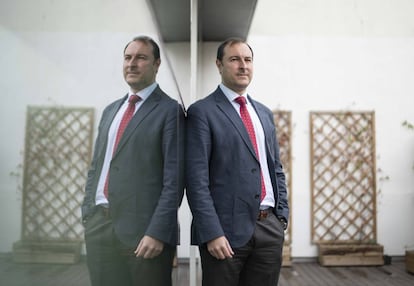In Madrid, investors eye tenants who still pay just €7 a month
Despite soaring rent prices, there are still a few lucky residents on old Franco-era contracts. Real estate trusts are buying these properties as they wait for the occupants to pass away


The businessman Luis de Ulibarri has just snapped up eight apartments in the center of Madrid for €1.8 million, which comes out to just €225,000 each. Given the current property market, it seems like a great deal, but there is a catch. All the apartments come with a tenant on the old rental contracts fixed by law during Franco’s dictatorship. The lowest rent is €7; the highest is €700 for a place that would cost €1,800 a month at current market prices.
These rents have been frozen in time. While thousands of people in Madrid are struggling to pay exorbitant property prices, these tenants are enjoying the terms of contracts signed before May 9, 1985. Thirty-five years on, there is only a handful of these fortunate tenants left in Madrid, and most prefer to keep quiet, perhaps fearing the envy of neighbors who are paying so much more.
Might we have to wait until 2050 in some cases? Well, we’ll suck that up
Luis de Ulibarri, Almagro Capital
For the landlords, these units have proved an enduring headache. But De Ulibarri, a 40-year-old tax attorney, is one of a number of investors willing to risk taking the properties off their hands. He is the president of Almagro Capital, a Real Estate Investment Trust (REIT) with a portfolio of 48 properties, sizeable enough for a margin of error. The REIT calculates the tenants’ life expectancy, buys the properties, then waits for them to enter the market, when they can expect a return on their investment. “Might we have to wait until 2050 in some cases? Well, we’ll suck that up,” says De Ulibarri.
The eight apartments in Madrid have been purchased from Sareb, the company set up after the property bubble bust to help banks offload their toxic real estate assets. All the units are located in Centro and Chamberí, the two most expensive districts of the capital, where according to the online real-estate site Idealista, a 76-square-meter unit will go for €1,421 and €1,375 a month, respectively. A spokeswoman for Sareb says they have fewer than 100 old-rent properties across Spain out of around 50,000, and the package bought by De Ulibarri was the last of them in Madrid.
These kinds of properties are not registered as such anywhere, but the number of individuals in the Madrid region paying rent far below the market price represents 2.7% of the population, according to a National Statistics Institute (INE) Standard of Living survey, though that figure also includes other groups such as those on subsidized housing.

When the owners of these old rental contracts die off, the law allows a maximum of two subrogations, one for the contract holder’s spouse to assume the contract indefinitely, and one for the contract holder’s children for a limited period of two years. These homes have always been sought by investors, and now more than ever as the clock ticks and the rental market continues to boom.
Pay-offs
“Previously, it was big businessmen like López Brea and Francis Franco [one of the late dictator’s grandchildren] who were in it, but ever since the Real Estate Investment Funds (REITs) were set up, many of them have entered the arena,” says Adolfo Calvo-Parra, a lawyer at Madrid’s Association of Property Administrators.
Properties with tenants on old rental contracts used to be considered high-risk purchases, and some landlords notoriously resorted to intimidating the occupants to see if they could chase them out. Less well known are the stories of tenants who received large amounts in exchange for breaking their old rental contracts, according to Calvo-Parra. Other lawyers consulted by this newspaper say they have met tenants who were given more than €100,000 to leave.
But at this point, most of the remaining old-contract tenants aim to be there until the end of their days. “They are the ones who have turned down the offers,” says Ramón Gutiérrez of Adarve Abogados. There is also a risk that the person on the old rental contract will suddenly produce a relative to hand the lease to. “We are aware that an older man might marry his carer,” says De Ulibarri.
These homes have always been sought after by investors, and now more than ever as the clock ticks and the rental market continues to boom
The eight apartments are the first old rent purchases Almagro Capital has made, and De Ulibarri points out that this line of business will not be central to the REIT. The main thrust of their business consists of properties that they have bought from elderly people who then lease the same property right back from them until they die. Consequently, their shareholder reports include the ages of their tenants and their life expectancy.
Another investor in property with occupants on old rental contracts is Alejandro Bancalero, a 47-year-old lawyer who runs the law firm Bancalero Abogados. He only buys homes with tenants over the age of 80 because anything less seems like a poor investment, given life expectancy nowadays. His company has seven properties in Madrid: in La Latina, on Serrano street and in Carabanchel, and others in Seville and Marbella.
They may lose money temporarily on some of these properties. For example, one 83-year-old tenant pays just €90 per month and the company foots the community bill of €300 as well as the annual IBI property tax. Bancalero’s advice is to foster a sense of resignation if you want to get into the game. “We work in the long term. You have to be patient,” he says.
When Franco was a progressive
The Franco regime's urban rental law of 1964 could have been the work of today's Socialist government: "The liberalization movement of urban property must be tempered, not only at the rate determined by the country's economic circumstances, but also according to the undeniable demands of social justice, which constitute the core and the raison d'être of our political regime," began the legislation protecting tenants.
Franco established the law some years after the Civil War to protect people who had lost their homes in the conflict. Consequently, landlords had little control over how they rented their properties. “Landlords harbored a tremendous animosity towards our ‘friend’ Paco [Francisco Franco],” says lawyer Calvo-Parra.
Ironically, it was a Socialist government that eventually put an end to Franco’s rental system. Proposed by the Socialist Party (PSOE) minister Miguel Boyer and known as the Boyer Law, the new legislation ended the obligatory renewals of contracts signed after May 9, 1985. Later, the Urban Leases Act of 1994 limited the number of people who could assume the old contract to a maximum of two, with a view to phasing them out.
Now, tenant protection has once again become a pressing issue. Franco’s solution was to maintain the price that was fixed by the landlord and tenant when the contract was first signed; now, the governing Socialist coalition is proposing price caps according to the district. The measure would be put in the hands of regional governments and local councils, but the Madrid regional government has already rejected the measure.
English version by Heather Galloway.
Tu suscripción se está usando en otro dispositivo
¿Quieres añadir otro usuario a tu suscripción?
Si continúas leyendo en este dispositivo, no se podrá leer en el otro.
FlechaTu suscripción se está usando en otro dispositivo y solo puedes acceder a EL PAÍS desde un dispositivo a la vez.
Si quieres compartir tu cuenta, cambia tu suscripción a la modalidad Premium, así podrás añadir otro usuario. Cada uno accederá con su propia cuenta de email, lo que os permitirá personalizar vuestra experiencia en EL PAÍS.
¿Tienes una suscripción de empresa? Accede aquí para contratar más cuentas.
En el caso de no saber quién está usando tu cuenta, te recomendamos cambiar tu contraseña aquí.
Si decides continuar compartiendo tu cuenta, este mensaje se mostrará en tu dispositivo y en el de la otra persona que está usando tu cuenta de forma indefinida, afectando a tu experiencia de lectura. Puedes consultar aquí los términos y condiciones de la suscripción digital.








































